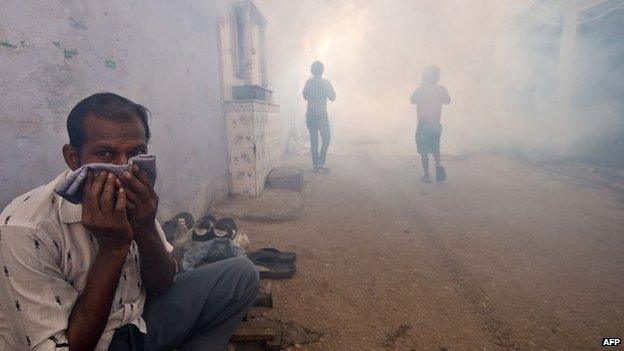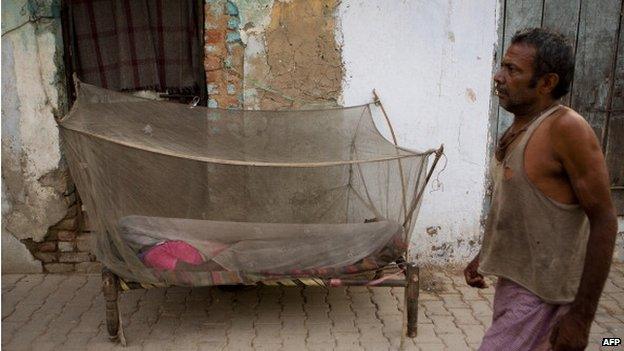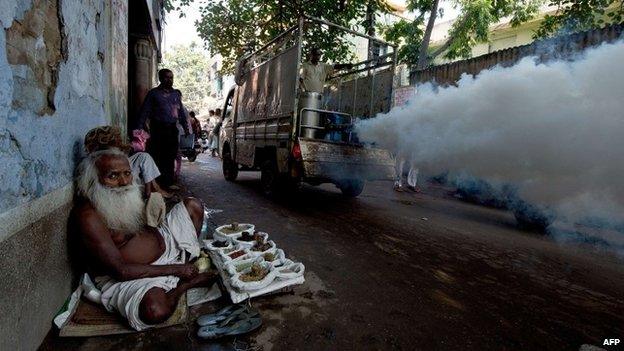India battles dengue fever outbreak
- Published

Dengue cases usually jump during and just after the rainy season in India
An outbreak of dengue fever since February has killed more than 100 people, inundated hospitals with patients and triggered school closures, reports Atish Patel.
In India, many savour the moment when the skies turn grey and monsoon rains lash down to bring respite from the excruciating summer heat.
This year, the country saw the heaviest rains in nearly two decades, particularly pleasing farmers who rely on the monsoon for their living.
But the rains also bring challenges, including the appearance of Aedes aegypti, a species of mosquito that spreads dengue and yellow fever.
The government says 109 Indians have died from the tropical illness, external in the first nine months of this year and 38,179 cases have been recorded in total, more than double the number for all of 2011.
Experts say this year's early and prolonged monsoon has provided more breeding grounds for disease-carrying mosquitoes, who lay their eggs in stagnant water, including pots of clean water, puddles and open sewage drains.
'Shortage of beds'
Dengue cases usually jump during and just after the rainy season, which normally lasts from June to September, but this year it has extended until October in some Indian states.
Hospitals and clinics across the country have been inundated with patients, putting a strain on emergency services, while many schools have shut as a precautionary measure.
"There has been a shortage of beds," said Dr Sanjay K Tandon, medical superintendent at Paras Spring Meadows Hospital, a private facility in the capital, Delhi.
"We have refused patients. If the critical phase for a patient is over, we explain to them that now you don't need admission, so let the other person get the advantage."

Nearly 3,000 cases of dengue have been reported in Delhi
Meanwhile, at Delhi's largest state-run hospital, routine surgeries were halted last week following a government order so that equipment and staff could attend to the daily rush of patients coming in for the past few weeks to be tested for the virus.
"Routine, planned surgeries have been deferred temporarily. But emergency operations, those that absolutely must happen, are still being done," said Dr RB Mittal, medical superintendent of Hindu Rao Hospital.
The areas worst affected in India have been the southern state of Kerala - where more than 23 people have died and 7,000 people are infected - and the western state of Maharashtra - which has registered 31 deaths and 2,681 infections.
The World Health Organisation says about half of the globe's population is now at risk from the infection and a study published in April in the scientific journal Nature, external found India had more cases of dengue than any other country in the world.
All hospitals and clinics in India are meant to report every case of confirmed dengue, but many don't, with some health experts believing there isn't enough oversight.
In Delhi, the official number of reported cases is 3,298. But Dr Navin Dang, who runs a medical diagnostics centre, said the real number could be 10 times higher.
"We have been testing for 50 to 60 patients every day over the past month and a half, and getting 20 to 25 positive results a day, so as a standalone lab, we have reported over 1,000 dengue patients," he said.
"The government numbers are totally underreported... to a very substantial extent. The government only picks up data from a few hospitals and labs."
Dr AC Dhariwal, director of the National Vector Borne Disease Control Programme, a government agency, admitted it was "very, very difficult to get accurate numbers".
Gareth Camilo Sims, a Welsh expatriate living in Delhi, was recently diagnosed with dengue fever, also called "breakbone disease," after suffering from a headache, exhaustion, high temperature and body rashes - clear signs he had contracted the virus despite taking preventive steps.
"I was really careful," the 31-year-old lawyer said. "I put mosquito repellent on a few times a day and I haven't been bitten many times," he added.
His blood platelet count didn't drop to dangerous levels, but when it does, it can be deadly. There is no treatment for the virus.

Dengue fever is spread by mosquitoes
Mr Sims said he was advised to keep hydrated by drinking six litres of water each day, take a paracetamol pill every six hours and occasionally apply a cold flannel to his forehead to reduce fever.
Mr Dhariwal says surveillance is being carried out across the country and in hotspot areas, extensive education campaigns are being organised to inform the public of risks.
"Dengue enters a country and it stays there," he added.
But some have blamed the government for not doing enough to tackle the spread of the disease despite fresh cases being reported year after year.
"It's a combined responsibility for everybody," Dr Dang said.
"But of course the government as the elected representative has to play a significant role.
"If proper measures are taken, there's no stagnant water, there's proper fumigation, sewage and drainpipes are cleaned properly, there is no water logging, and there are fish in water bodies, I'm quite sure things can be brought under control," he says.
- Published15 October 2010